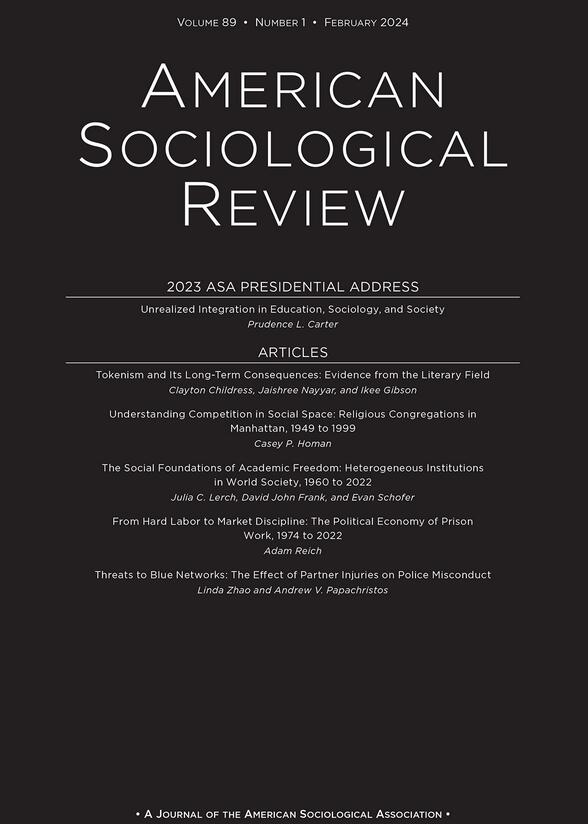Identity Theft, Trust Breaches, and the Production of Economic Insecurity
IF 6.2
1区 社会学
Q1 SOCIOLOGY
引用次数: 0
Abstract
Across various domains of social life, organizational reliance on personal data and exposure to unanticipated financial hardship have transformed Americans’ life chances and access to opportunities. This article examines an area where they intersect: the hardship caused by breakdowns in information systems. I focus on the case of identity theft, showing how that event—experienced by tens of millions of Americans annually—contributes to economic insecurity. To do so, I first develop a theory of insecurity that links feelings of precariousness to breaches of trust at three levels: interpersonal, organizational, and systemic. Drawing on an original qualitative study of identity theft resolution, I find that most victims worried about their financial lives because they could no longer count on certain people, organizations, or systems. Beneath this commonality, race and class informed feelings of insecurity and associated coping strategies following identity theft. Low-income people and people of color tended to direct suspicion at personal networks and report ending relationships and informal assistance. In contrast, middle- and upper-income and White individuals disproportionately blamed organizations and demanded their protection. These findings—along with the trust-based theory that helped make them visible—have important implications for the study of insecurity, inequality, and trust in the information age.身份盗窃、信任破坏和经济不安全的产生
在社会生活的各个领域,组织对个人数据的依赖和对意外经济困难的暴露已经改变了美国人的生活机会和获得机会的途径。本文研究了两者相交的一个领域:信息系统故障造成的困难。我把重点放在身份盗窃的案例上,展示每年有数千万美国人经历的这种事件是如何导致经济不安全的。为此,我首先建立了一个不安全感理论,将不稳定的感觉与三个层面的信任违约联系起来:人际、组织和系统。根据对身份盗窃解决方案的原始定性研究,我发现大多数受害者担心他们的财务生活,因为他们再也不能指望某些人、组织或系统了。在这一共性之下,种族和阶级反映了身份盗窃后的不安全感和相关的应对策略。低收入人群和有色人种倾向于将怀疑指向个人网络,并报告终止关系和非正式援助。相反,中高收入和白人不成比例地指责组织并要求他们的保护。这些发现——以及帮助它们变得可见的基于信任的理论——对研究信息时代的不安全感、不平等和信任有着重要的意义。
本文章由计算机程序翻译,如有差异,请以英文原文为准。
求助全文
约1分钟内获得全文
求助全文
来源期刊

American Sociological Review
SOCIOLOGY-
CiteScore
13.30
自引率
3.30%
发文量
35
期刊介绍:
The American Sociological Association (ASA) is a non-profit membership association established in 1905. Its mission is to advance sociology as a scientific discipline and profession that serves the public good. ASA is comprised of approximately 12,000 members including faculty members, researchers, practitioners, and students in the field of sociology. Roughly 20% of the members work in government, business, or non-profit organizations.
One of ASA's primary endeavors is the publication and dissemination of important sociological research. To this end, they founded the American Sociological Review (ASR) in 1936. ASR is the flagship journal of the association and publishes original works that are of general interest and contribute to the advancement of sociology. The journal seeks to publish new theoretical developments, research results that enhance our understanding of fundamental social processes, and significant methodological innovations. ASR welcomes submissions from all areas of sociology, placing an emphasis on exceptional quality.
Aside from ASR, ASA also publishes 14 professional journals and magazines. Additionally, they organize an annual meeting that attracts over 6,000 participants. ASA's membership consists of scholars, professionals, and students dedicated to the study and application of sociology in various domains of society.
 求助内容:
求助内容: 应助结果提醒方式:
应助结果提醒方式:


